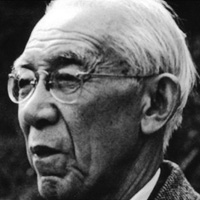Nishiwaki Junzaburo / 西脇順三郎
Nishiwaki Junzaburô (1894 – 1982) was arguably the most important and influential Japanese modernist poet. Exceptionally gifted in learning foreign languages, Nishiwaki first began writing poetry not in his mother tongue but in English, French, and Latin. In 1922, Nishiwaki went to England to further study English literature. There he discovered various modernist movements, which were flowing in from the continent at that time. Nishiwaki’s first book was a collection of his English poems entitled Spectrum published in London in 1925. Back in Japan, now Professor of English at Keiô University, he published a theoretical treatise on “what poetry is,” entitled Chôgenjitsu shugi shiron (Surrealist Poetics) in 1929.
In 1933, at the age of forty, Nishiwaki published his first collection of poems written in Japanese, Ambarvalia. The poems collected in this volume proved to be groundbreaking in the history of modern Japanese poetry. It revolutionized the concept as well as the language of modern Japanese poetry by boldly incorporating a language of translation.
The luminous modernist language of Ambarvalia all but disappeared in his second collection of Japanese poems, Tabibito kaerazu (1947, No Traveler Returns) published after a long silence caused by the war. Many regard that this work indicates Nishiwaki’s return to Eastern poetics with the sentiment of mujô at its core. After this volume, Nishiwaki was to produce ten more collections of Japanese poems. Keenly interested in James Joyce’s linguistic experimentation, Nishiwaki’s later works began to resemble the polyglot text of Finnegans Wake, though Nishiwaki’s central tone of mujô never disappeared.
“Sorcery in a Vegetable Garden” is from the book Eterunitasu (Latin for eternity, Aeternitas, transcribed in hiragana) published in 1962. My translation is deeply indebted to Professor Niikura Toshikazu’s laborious work, Nishiwaki Junzaburô zenshi inyu shûsei (1982).


